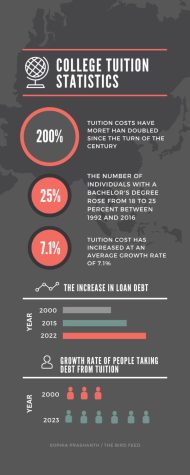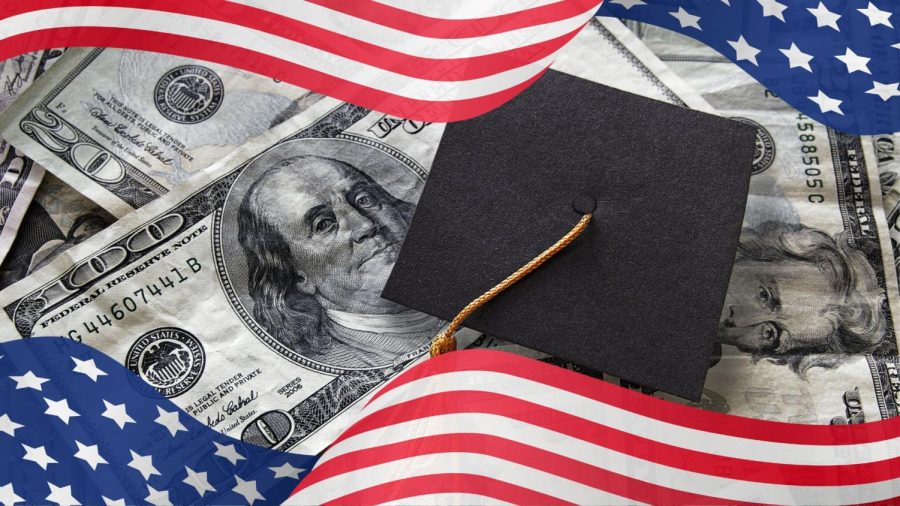The Sky-Rocketing Cost of Education is Killing “The American Dream”
With an annual growth rate of 7.1%, the average cost of college tuition in the U.S. has more than doubled since the turn of the century, leaving college students in a problematic situation.
January 18, 2023
We all remember being a little kid full of dreams, wanting to go to Harvard or Yale, thinking this dream will turn into a reality because we wanted it to.
We all remember telling our parents, teachers and grandparents that we would get into Harvard and become a lawyer like Elle Woods, or walk on the moon like Neil Armstrong.
We all remember feeling so proud telling our teachers that we have our whole life figured out and we’re going to go to our dream college and be such a successful person.
And we all remember being absolutely crushed as soon as we faced reality and realized that those aspirations will never be realized because of the price tag attached.
When I was around 10, I remember feeling so joyful printing out my picture of the logo of Harvard and pinning it right in the center of my dream board. This dream continued until I was about 14, and when college started becoming serious I had to talk with my parents about my future, what classes I need to take, and what I really wanted to do with my life.
I told them, “I want to go to Harvard and become a lawyer.” They laughed and continued to tell me, “That’s not going to happen.” They told me that Harvard is expensive and even if I made it in, they still wouldn’t be able to pay for my tuition. They told me that I should start looking into in-state options since it’s cheaper and in their budget.
That’s when my dreams were shattered, stepped on, and set on fire.
The American Dream, which is defined as “a joyful way of living that is believed by many Americans as something that can be accomplished by anyone in the U.S., especially by working hard and becoming successful,” is the country’s most important selling point. It portrays the nation as a hopeful place of possibility.
Despite this, the “Dream” is rapidly evaporating due to the continually rising cost of college tuition.
Rising Prices
Education is steadily becoming more necessary in today’s society, more than it was just three decades ago. The number of individuals with a bachelor’s degree rose from 18 to 25% between 1992 and 2016, while the percentage of people with higher degrees, such as master’s, professional, and doctorate degrees, grew from 9 to 14%.
Higher education is more necessary than ever to compete in today’s society; however, because of the increase in tuition costs, graduates start out in life with debt that could last for decades. Most college students have limited options: pay the price, take student loans, manage to get a scholarship, or just don’t go.
In the United States, the average cost of education per student annually, including books, supplies, and living expenses, is $35,551, the same cost as a nice car or down payment on a house. Tuition alone for an in-state student enrolled in a public 4- year university costs on average $25,707.
With an annual growth rate of 7.1%, the average cost of education has more than doubled since the turn of the century, leaving college students in a problematic (and expensive) situation.
Co$tly Decisions
South Forsyth High School Graduate of 2022, Naisha Roy, is currently attending New York University (NYU) in New York City, New York, and spends “$58k a year to go to NYU.”
The price tag loomed large on Roy’s mind as she considered where she wanted to continue her education.
“The cost definitely made me reconsider going to this school, to the point where I was honestly constantly second guessing whether it would be worth it for me or not to attend,” Roy said. “On one hand I wanted to make the best of this amazing opportunity handed to me, but on the other hand I felt so guilty spending this much money on myself.”
Roy is not the only one, as many other American high school graduates struggle with this problem every day.
Abroad, different countries have made a variety of attempts to lessen the cost of higher education. In Mexico, public college tuition is free, besides the trivial fees for administrative tasks. But how is America assisting its future with the prohibitive expense of college tuition? The answer is simple: they aren’t.
It shouldn’t be the case that everyone must endure hardship and pay a price to lead stable, productive lives. Simply trying to gain an education, which is essential for survival, shouldn’t cause somebody to have financial issues later in life.

The Price of Regret
Even aside from the steep price tag, some may also find themselves questioning the value of their diplomas post-graduation.
More than one-third of the Americans surveyed for a recent Newsweek article admitted they were unhappy with the college decisions they made, and among those, 28% regret taking out student loans to pay for their education.
The most current statistics show that more than half of college graduates have debt from student loans. Their average debt load was around $17,000 as of 2005. However, in less than 20 years, that amount had increased to close to an average of $30,000, directly affecting 48 million student borrowers.
The enormity of this debt has the potential to cause a trillion-dollar issue that would impact almost everyone in the country and potentially the world, given the looming implications on the American economy.
Kae Hall, a student teacher at South Forsyth High School, voiced her dilemma on student loans. “In addition to any other debt that I have, I also have the debt of student loans,” Hall said.
Hall also expressed that if she could have done anything differently, before she decided to take student loans, “ [I would have done] more research [into] scholarships.”
A Long-Lasting Burden
Post-graduation, the burden of student loan debt may force grads to accept lower-paying, lower-skill positions despite their qualifications in order to start making debt payments straight away.
As a result, graduates who are in debt frequently miss out on the supposed advantages of having a degree. A CNBC study found that “85 percent of student loan borrowers believe that trouble saving has delayed their chance to buy a house,” and additional data shows that “Those with student loan debt also are less likely to have taken out car loans.”
Overall, borrowers’ credit scores are lower. They seem to live with their parents more typically. A growing number of students, particularly low-income students, are debating whether to attend college at all due to the potential of such enormous debt, a phenomenon which could worsen the already detrimental lack of educated workers in the U.S. workforce.
To sum up this heartbreaking piece, as time goes by, the American dream ceases to exist. I am as terrified of what lies ahead as everyone else who is reading this piece. But rather than being afraid, we should instead be eager to see what the future holds.
Can we, though, when so many of our dreams are centered around the price tag that ultimately dictates our lives?





